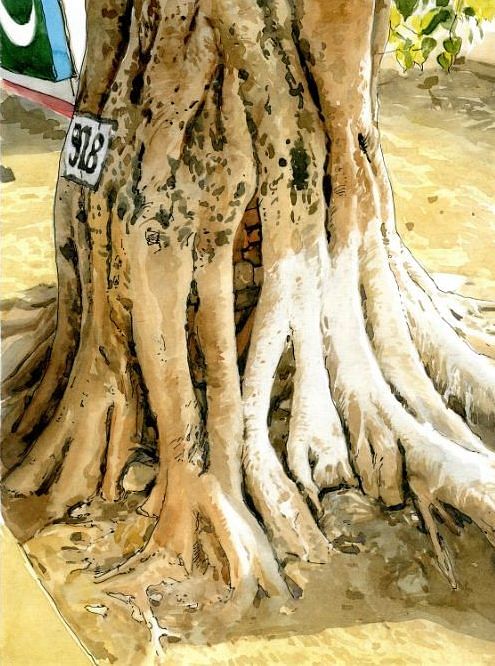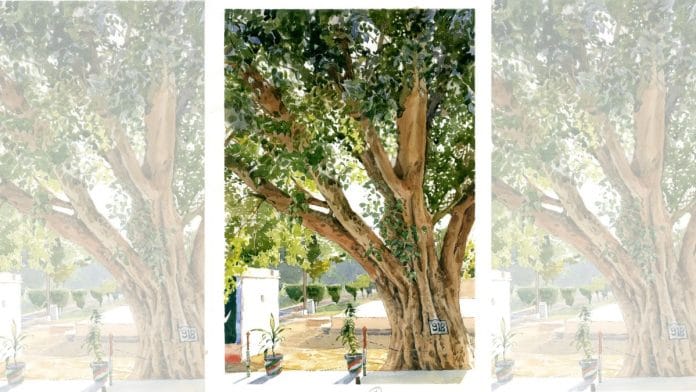If I hadn’t seen this for myself, I would have put this headline down as pure clickbait. Let us start at the beginning. The international boundary between India and Pakistan is managed by the Border Security Force (BSF) at a checkpost at Suchetgarh, a small village barely twenty-eight kilometres from Jammu city. Known as BSF’s Octroi Border Outpost, it has drawn its name from an octroi collection point in the village. Once inside the high-security entrance, visitors can walk straight ahead towards the international boundary demarcated in 1947 by the so-called Radcliffe Line, named after its architect Sir Cyril Radcliffe. The visible indicator of this line is in the form of short, white, pyramid-shaped pillars painted with their serial numbers in black.
One such pillar– bearing the serial number 918 – happens to be on the ‘zero line’ within the checkpost. Another pillar bearing the serial number 919 can be seen nearby. Close to pillar 918 stands a peepal tree. Due to seasonal growth every year, its trunk kept increasing in girth and started pushing against pillar number 918. Gradually, it surrounded the pillar and, in due course, completely engulfed it. A scrutiny of the tree’s trunk still reveals vestiges of the pillar but that too will soon disappear. Fortunately, the Indian BSF and the Pakistan Rangers guarding their respective borders did not cut the tree. Instead, they painted serial number 918 on its trunk, accepting it as the new boundary pillar. This is probably the only living border pillar on the international boundary between the two countries, making the tree even more attractive to visitors who swarm this place.

The peepal is erect and handsome but does not yet have the dignified look of an ancient tree, though it could be close to a hundred years. Its trunk is quite fissured. Three main branches bend towards India and two others lean towards Pakistan. Its characteristic crown of dark green leaves is a delight to behold. On either side of the tree, soldiers built concrete rectangular platforms.
The Jammu & Kashmir government intends to develop this border checkpost into a tourist hub, but progress has been slow. Marking the 41st World Tourism Day, the state’s tourism department launched an open-roof luxury bus between Jammu city and Suchetgarh border on 27 September 2020.
Life for the tree – as for the villagers of Suchetgarh – is as tough as it is unpredictable. Although an all-out war has not broken out in decades, the tension is always palpable. Residents are used to the sudden burst of gunshots or the exploding thud of mortar shells as they rip through houses, vehicles or livestock in their way. The ancient Raghunath temple built in 1837 near the checkpost was partially damaged due to a similar gunfire incident in 1971. For now, the tree is fine. The guns have fallen silent, especially after the two countries signed a peace treaty in February 2021. Hopefully, tranquillity and amity will prevail so that tourism takes root here and the unique tree that swallowed an entire pillar continues to be admired and celebrated.
Common names: Sacred Fig Tree (English); Ashwattha (Sanskrit); Peepal Tree, Bodhi Tree (Hindi)
Scientific name: Ficus religiosa L.
Family: Fig (Moraceae)
Where to see: India and Pakistan border at Suchetgarh, R.S. Pura block, Jammu district, Jammu & Kashmir
Latitude: 32.5660° N; Longitude: 74.6740° E
Altitude: Approximately 333 metres
![]() This excerpt from Iconic Trees of India:75 Natural Wonders by S Natesh has been published with permission from Roli Books.
This excerpt from Iconic Trees of India:75 Natural Wonders by S Natesh has been published with permission from Roli Books.







Really the nature do not had borders and grudges . This peepul tree is symbolic iconic for Lord Ram and Allaha Rahim . This tree got super spiritual ? fulfillment.